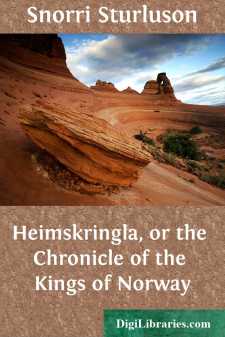Categories
- Antiques & Collectibles 13
- Architecture 36
- Art 48
- Bibles 22
- Biography & Autobiography 813
- Body, Mind & Spirit 142
- Business & Economics 28
- Children's Books 17
- Children's Fiction 14
- Computers 4
- Cooking 94
- Crafts & Hobbies 4
- Drama 346
- Education 46
- Family & Relationships 57
- Fiction 11829
- Games 19
- Gardening 17
- Health & Fitness 34
- History 1377
- House & Home 1
- Humor 147
- Juvenile Fiction 1873
- Juvenile Nonfiction 202
- Language Arts & Disciplines 88
- Law 16
- Literary Collections 686
- Literary Criticism 179
- Mathematics 13
- Medical 41
- Music 40
- Nature 179
- Non-Classifiable 1768
- Performing Arts 7
- Periodicals 1453
- Philosophy 64
- Photography 2
- Poetry 896
- Political Science 203
- Psychology 42
- Reference 154
- Religion 513
- Science 126
- Self-Help 84
- Social Science 81
- Sports & Recreation 34
- Study Aids 3
- Technology & Engineering 59
- Transportation 23
- Travel 463
- True Crime 29
Heimskringla, or the Chronicle of the Kings of Norway
by: Snorri Sturluson
Description:
Excerpt
In this book I have had old stories written down, as I have heard them told by intelligent people, concerning chiefs who have have held dominion in the northern countries, and who spoke the Danish tongue; and also concerning some of their family branches, according to what has been told me. Some of this is found in ancient family registers, in which the pedigrees of kings and other personages of high birth are reckoned up, and part is written down after old songs and ballads which our forefathers had for their amusement. Now, although we cannot just say what truth there may be in these, yet we have the certainty that old and wise men held them to be true.
Thjodolf of Hvin was the skald of Harald Harfager, and he composed a poem for King Rognvald the Mountain-high, which is called "Ynglingatal." This Rognvald was a son of Olaf Geirstadalf, the brother of King Halfdan the Black. In this poem thirty of his forefathers are reckoned up, and the death and burial-place of each are given. He begins with Fjolner, a son of Yngvefrey, whom the Swedes, long after his time, worshipped and sacrificed to, and from whom the race or family of the Ynglings take their name.
Eyvind Skaldaspiller also reckoned up the ancestors of Earl Hakon the Great in a poem called "Haleygjatal", composed about Hakon; and therein he mentions Saeming, a son of Yngvefrey, and he likewise tells of the death and funeral rites of each. The lives and times of the Yngling race were written from Thjodolf's relation enlarged afterwards by the accounts of intelligent people.
As to funeral rites, the earliest age is called the Age of Burning; because all the dead were consumed by fire, and over their ashes were raised standing stones. But after Frey was buried under a cairn at Upsala, many chiefs raised cairns, as commonly as stones, to the memory of their relatives.
The Age of Cairns began properly in Denmark after Dan Milkillate had raised for himself a burial cairn, and ordered that he should be buried in it on his death, with his royal ornaments and armour, his horse and saddle-furniture, and other valuable goods; and many of his descendants followed his example. But the burning of the dead continued, long after that time, to be the custom of the Swedes and Northmen. Iceland was occupied in the time that Harald Harfager was the King of Norway. There were skalds in Harald's court whose poems the people know by heart even at the present day, together with all the songs about the kings who have ruled in Norway since his time; and we rest the foundations of our story principally upon the songs which were sung in the presence of the chiefs themselves or of their sons, and take all to be true that is found in such poems about their feats and battles: for although it be the fashion with skalds to praise most those in whose presence they are standing, yet no one would dare to relete to a chief what he, and all those who heard it, knew to be a false and imaginary, not a true account of his deeds; because that would be mockery, not praise.
OF THE PRIEST ARE FRODEThe priest Are Frode (the learned), a son of Thorgils the son of Geller, was the first man in this country who wrote down in the Norse language narratives of events both old and new. In the beginning of his book he wrote principally about the first settlements in Iceland, the laws and government, and next of the lagmen, and how long each had administered the law; and he reckoned the years at first, until the time when Christianity was introduced into Iceland, and afterwards reckoned from that to his own times. To this he added many other subjects, such as the lives and times of kings of Norway and Denmark, and also of England; beside accounts of great events which have taken place in this country itself....


